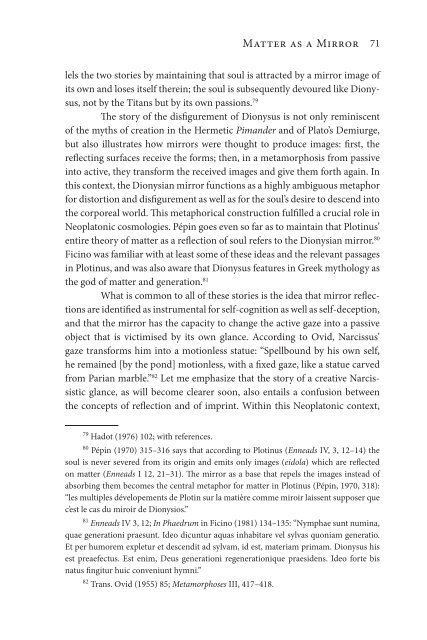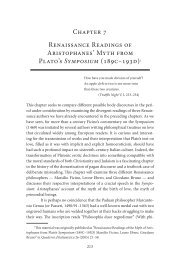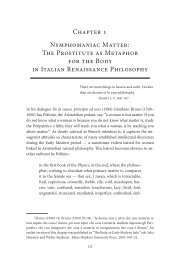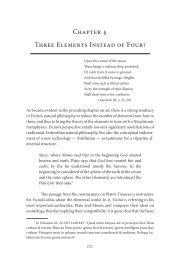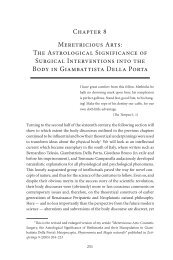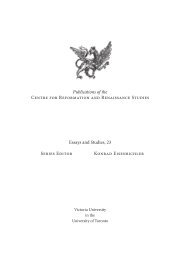Chapter 2 Matter as a Mirror: Marsilio Ficino and Renaissance ...
Chapter 2 Matter as a Mirror: Marsilio Ficino and Renaissance ...
Chapter 2 Matter as a Mirror: Marsilio Ficino and Renaissance ...
Create successful ePaper yourself
Turn your PDF publications into a flip-book with our unique Google optimized e-Paper software.
<strong>Matter</strong> <strong>as</strong> a <strong>Mirror</strong> 71<br />
lels the two stories by maintaining that soul is attracted by a mirror image of<br />
its own <strong>and</strong> loses itself therein; the soul is subsequently devoured like Dionysus,<br />
not by the Titans but by its own p<strong>as</strong>sions. 79<br />
The story of the disfigurement of Dionysus is not only reminiscent<br />
of the myths of creation in the Hermetic Pim<strong>and</strong>er <strong>and</strong> of Plato’s Demiurge,<br />
but also illustrates how mirrors were thought to produce images: first, the<br />
reflecting surfaces receive the forms; then, in a metamorphosis from p<strong>as</strong>sive<br />
into active, they transform the received images <strong>and</strong> give them forth again. In<br />
this context, the Dionysian mirror functions <strong>as</strong> a highly ambiguous metaphor<br />
for distortion <strong>and</strong> disfigurement <strong>as</strong> well <strong>as</strong> for the soul’s desire to descend into<br />
the corporeal world. This metaphorical construction fulfilled a crucial role in<br />
Neoplatonic cosmologies. Pépin goes even so far <strong>as</strong> to maintain that Plotinus’<br />
entire theory of matter <strong>as</strong> a reflection of soul refers to the Dionysian mirror. 80<br />
<strong>Ficino</strong> w<strong>as</strong> familiar with at le<strong>as</strong>t some of these ide<strong>as</strong> <strong>and</strong> the relevant p<strong>as</strong>sages<br />
in Plotinus, <strong>and</strong> w<strong>as</strong> also aware that Dionysus features in Greek mythology <strong>as</strong><br />
the god of matter <strong>and</strong> generation. 81<br />
What is common to all of these stories is the idea that mirror reflections<br />
are identified <strong>as</strong> instrumental for self-cognition <strong>as</strong> well <strong>as</strong> self-deception,<br />
<strong>and</strong> that the mirror h<strong>as</strong> the capacity to change the active gaze into a p<strong>as</strong>sive<br />
object that is victimised by its own glance. According to Ovid, Narcissus’<br />
gaze transforms him into a motionless statue: “Spellbound by his own self,<br />
he remained [by the pond] motionless, with a fixed gaze, like a statue carved<br />
from Parian marble.” 82 Let me emph<strong>as</strong>ize that the story of a creative Narcissistic<br />
glance, <strong>as</strong> will become clearer soon, also entails a confusion between<br />
the concepts of reflection <strong>and</strong> of imprint. Within this Neoplatonic context,<br />
79 Hadot (1976) 102; with references.<br />
80 Pépin (1970) 315–316 says that according to Plotinus (Enneads IV, 3, 12–14) the<br />
soul is never severed from its origin <strong>and</strong> emits only images (eidola) which are reflected<br />
on matter (Enneads I 12, 21–31). The mirror <strong>as</strong> a b<strong>as</strong>e that repels the images instead of<br />
absorbing them becomes the central metaphor for matter in Plotinus (Pépin, 1970, 318):<br />
“les multiples dévelopements de Plotin sur la matière comme miroir laissent supposer que<br />
c’est le c<strong>as</strong> du miroir de Dionysios.”<br />
81 Enneads IV 3, 12; In Phaedrum in <strong>Ficino</strong> (1981) 134–135: “Nymphae sunt numina,<br />
quae generationi praesunt. Ideo dicuntur aqu<strong>as</strong> inhabitare vel sylv<strong>as</strong> quoniam generatio.<br />
Et per humorem expletur et descendit ad sylvam, id est, materiam primam. Dionysus his<br />
est preaefectus. Est enim, Deus generationi regenerationique praesidens. Ideo forte bis<br />
natus fingitur huic conveniunt hymni.”<br />
82 Trans. Ovid (1955) 85; Metamorphoses III, 417–418.


